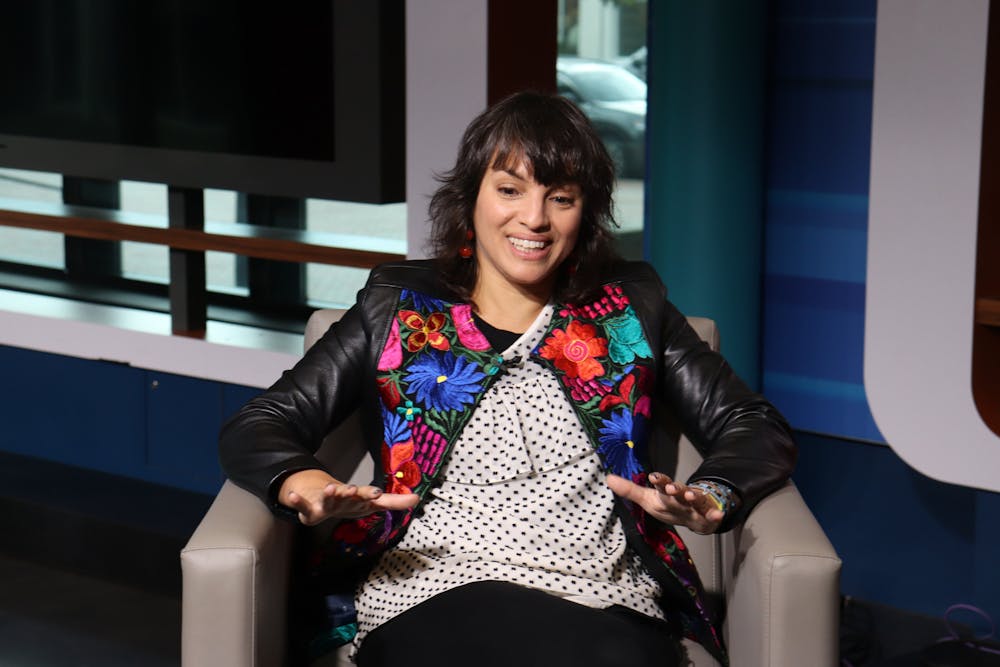CORRECTION: A previous version of this article took out of context messages and anecdotes from Guzmán’s book and past experiences. Elon News Network regrets this error.
Mónica Guzmán — author of Elon University’s 2023-24 common reading book “I Never Thought of It That Way: How to Have Fearlessly Curious Conversations in Dangerously Divided Times,” — said it is vital for communities to have difficult conversations to create connection.
Guzmán’s lecture on Sept. 21 was a part of Elon’s speaker series — presented by WUNC North Carolina Public Radio — and explored themes of “creating together.”.
Guzmán, a Mexican immigrant, said it is important to listen to and learn from others.
“People only hear when they’re heard,” Guzmán said.
She said her book emphasized the three paths to separation — sorting, division and siloing — which lead to disunity.
“These three paths to division meet the challenges of the present moment,” she said. “We are so divided, blinded – judging each other more while engaging each other less."
During the lecture, Guzmán said she attended a workshop in July led by the Braver Angels — a New-York based nonprofit organization dedicated to political depolarization in the U.S. — focused on improving the spirit of American politics in Gettysburg, Pennsylvania.
Guzmán said this convention opened her mind to understand that when people listen to others, they can have civil and open-minded conversations.
Guzmán encouraged listeners to “ask how, not why” when engaging in conversations with others.
“We are all important people with important things to say,” Guzmán said.
She also emphasized the importance of cultural and societal differences, and how they impact our daily routines.
“All of us have rich, vivid and complex lives,” Guzmán said.
She then focused on her own upbringing, and said it was difficult to grow up in a politically divided family as a Mexican immigrant — especially during the 2020 presidential election.
Guzmán said though she and her parents had political differences, being immigrants helped her family form an unbreakable bond.
“One of the things that happened in my family is that we really grew to rely on each other,” Guzmán said. “It was hard. And we didn't have any other family. We didn't have any other friends — more or less — so we really relied on each other.”
According to Guzmán, it is necessary to ask questions to create connections, but it can be dangerous if not handled carefully.
“Sometimes curiosity can feel aggravating, and like a reminder: it brings up your feelings of ‘I don’t belong here,’” Guzmán said. “The danger is when those conversations start to be filled with othering towards the people who are in the culture, and how evil and awful they are.
Guzmán said two weeks ago, she learned about the word “sonder” — the realization that other humans have just as vivid and complex lives as your own. She said she loves this word because it invites people to understand and value the opinions of others.
“It’s the idea that people like you and me have rich and complex lives that expand further than what people realize,” Guzmán said
Freshman Sydney Holmes said she enjoyed the personal stories Guzmán shared during her lecture.
“I think Mónica is very well spoken,” Holmes said. “She did a really good job articulating what we read in the book.”
Guzmán closed by encouraging students to ask difficult questions and engage in conversation with people who may seem closed off.
“The one-on-one is the only thing that can work,” she said. “It's sort of an ambassador to that person who can be who can be the person who says, ‘Hey, this is broken. I think there's a better way. Can we talk? I want to understand you.’”


